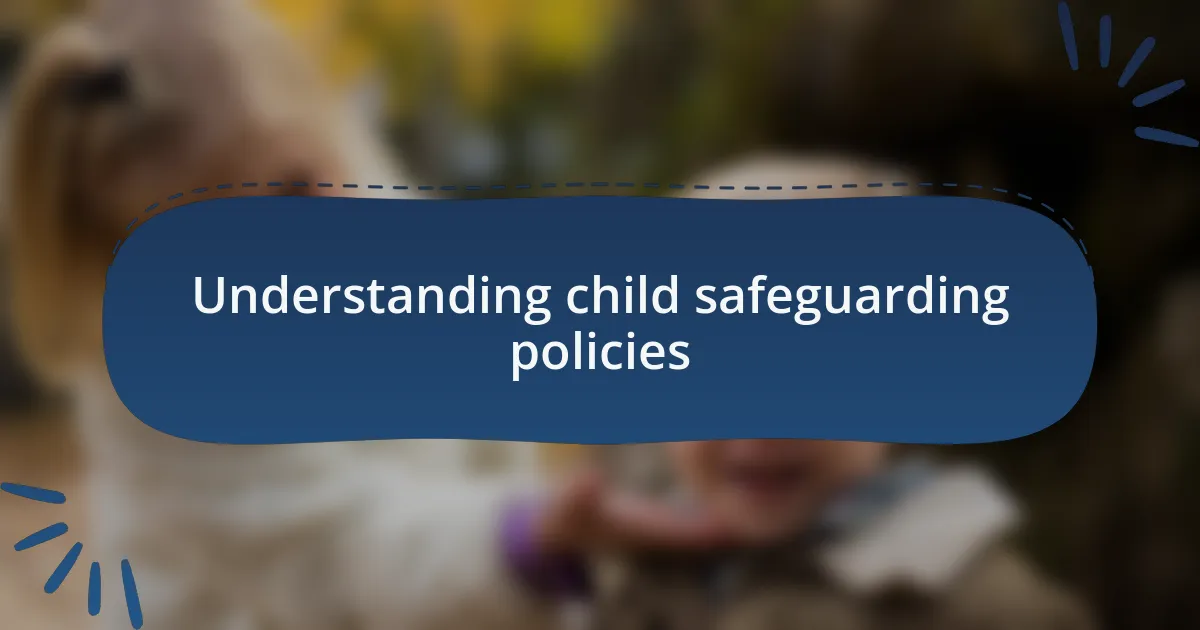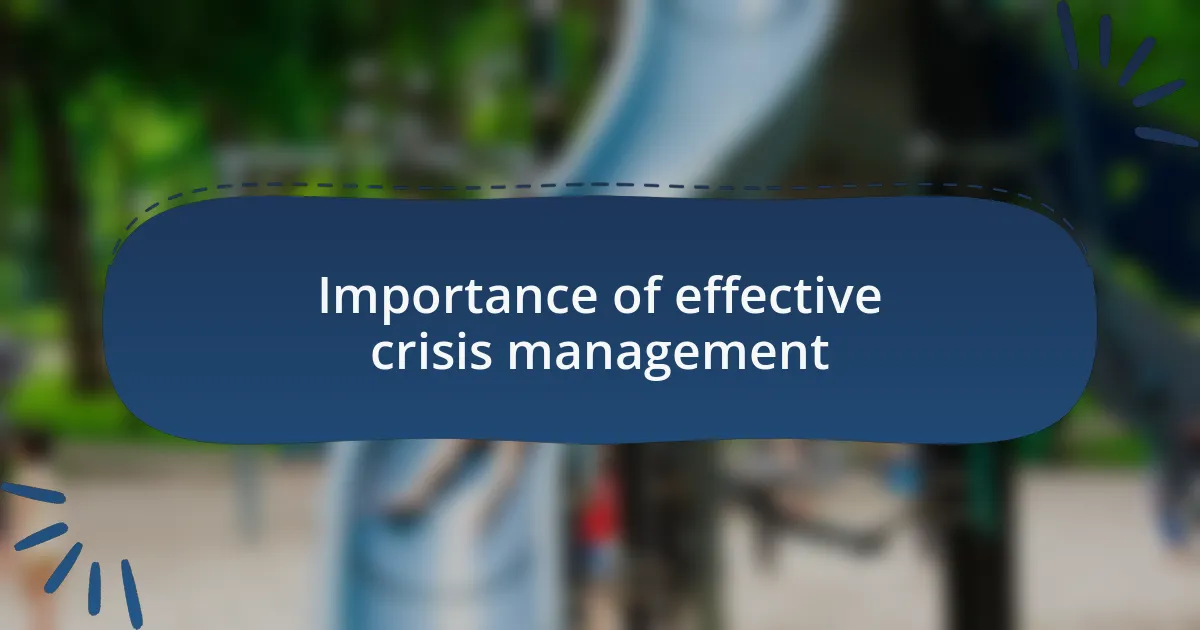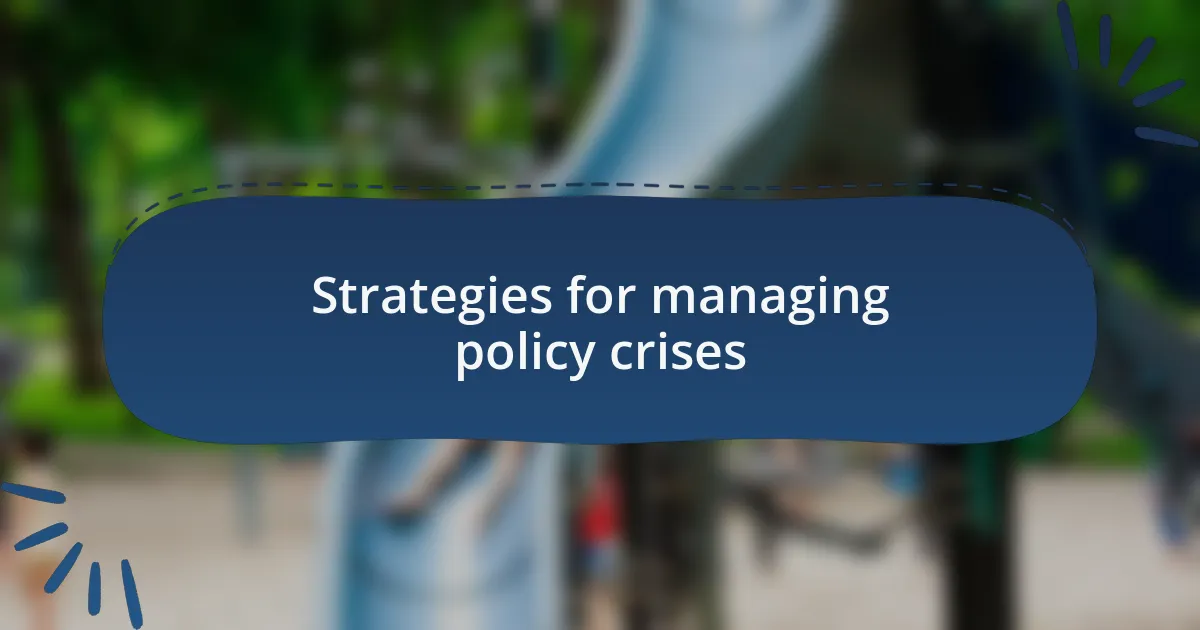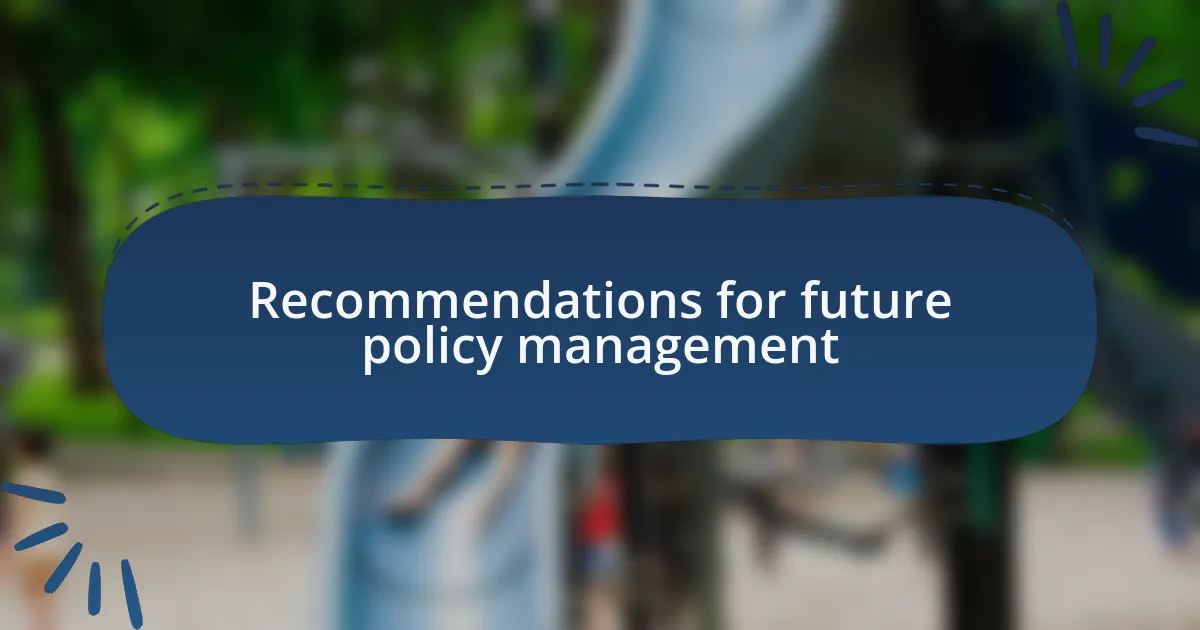Key takeaways:
- Child safeguarding policies are essential for creating a safe environment, requiring understanding and continuous training among staff.
- Effective crisis management, characterized by clear communication and predefined response plans, strengthens trust and cultivates a culture of safety.
- Listening to stakeholders and remaining adaptable during policy crises can lead to innovative solutions and improved strategies.
- Continuous dialogue, regular training, and feedback loops are critical for enhancing policy effectiveness and preparing staff for future challenges.

Understanding child safeguarding policies
Child safeguarding policies are critical frameworks that exist to protect children from harm and ensure their well-being. I remember the first time I reviewed a policy at the organization I was with; I was struck by how comprehensive it was yet flexible enough to adapt to various situations. It made me question, how many people truly understand the importance of these documents in creating a safe environment for children?
These policies should not just be seen as bureaucratic necessities but as essential tools for fostering trust and safety. In my experience, when staff members fully grasp the policies’ intent and details, it creates a culture where everyone feels responsible for safeguarding. I often wonder, how do we, as advocates, bridge the gap between policy and practice to ensure every child feels safe and supported?
Furthermore, it’s vital to note that effective safeguarding policies require continuous training and evaluation. I recall a particularly intense workshop we held to review our procedures, and it was eye-opening—the discussions revealed a deeper understanding and commitment to our responsibilities. Isn’t it fascinating how ongoing engagement can transform a simple policy into a living document that evolves with the needs of the children we serve?

Importance of effective crisis management
Effective crisis management is the backbone of any child safeguarding framework. In my experience, how an organization responds during a crisis can significantly impact trust and safety in the community. I recall a time when we faced an unexpected incident; the swift, transparent communication from leadership calmed fears and reinforced the importance of our safeguarding measures.
I’ve often been reminded that crises can serve as learning opportunities. When we navigated a challenging situation involving a potential breach, the team came together in ways I had never anticipated. It was a chance for open dialogue and led to improvements in our crisis protocols, reinforcing our commitment to protect the children in our care.
Reacting effectively during a crisis isn’t just about addressing the immediate issue; it’s also about setting a precedent for future actions. I still think back to a critical debriefing session we held afterward, where staff shared their feelings of empowerment and responsibility. Isn’t it impactful when a crisis can ultimately strengthen a team and enhance the safety net surrounding our children?

Strategies for managing policy crises
Clear communication is paramount when managing a policy crisis. I remember a time when our organization faced a sudden accusation regarding our practices. Instead of retreating, we organized an immediate town hall meeting. This allowed us to address concerns head-on, which not only quelled rumors but also fostered a sense of unity among staff and stakeholders. It’s fascinating how openness can transform anxiety into collaboration.
Another strategy that proved invaluable was having a predefined crisis response plan. During one particularly intense situation, having roles assigned ahead of time allowed us to act swiftly and decisively. Each team member knew their responsibilities, which minimized confusion. It made me realize how preparation can empower a team to handle pressure better. Why leave room for ambiguity in stressful situations when clarity can be so readily established?
Reflection post-crisis can also provide profound insights. After navigating a complex issue last year, we gathered to discuss what worked and what didn’t. I recall feeling a mixture of hope and determination during this session, as we crafted actionable steps to prevent similar occurrences. It made me wonder: aren’t the best lessons often born out of our most challenging experiences? Embracing this reflective practice not only strengthens policies but also deepens our commitment to safeguarding children.

Lessons learned from my experiences
One significant lesson I’ve learned is how vital it is to listen to the voices affected by a crisis. In one instance, after a policy misstep, I held small group discussions with staff and parents. Hearing their concerns directly not only brought fresh perspectives but also reminded me of the human element in policy-making. Have you ever found that simply listening can lead to solutions you hadn’t considered before?
Another takeaway was the importance of adaptability. During a crisis in which external pressures mounted, our initial response plan became less effective. I distinctly remember feeling the tension rise in our meetings, but it was during that discomfort that we brainstormed alternative approaches. I learned that flexibility can turn a potential downfall into an opportunity for growth. Isn’t it intriguing how supposed setbacks can lay the groundwork for improved strategies?
Finally, the emotional toll of managing policy crises cannot be understated. I vividly recall grappling with self-doubt after a particularly rough period, questioning my decisions and their impact on children’s welfare. Nevertheless, I realized that sharing these feelings with my colleagues cultivated empathy and support among us. This shared vulnerability reminded me that resilience is built together. How can we uplift each other through challenges if we don’t acknowledge our struggles?

Recommendations for future policy management
When it comes to future policy management, fostering continuous dialogue is crucial. I remember a time when we implemented a new child safeguarding policy without adequately consulting with frontline staff. The pushback was immense, and it became clear that involving those who directly interact with children would have led to a more effective policy. How often do we underestimate the value of those on the ground?
Training programs should also be an integral part of our approach to policy management. In my experience, offering regular training not only equips staff with the knowledge of new policies but also empowers them to adapt quickly during crises. Creating a culture of preparedness makes a significant difference. Isn’t it reassuring to know that when everyone feels prepared, they can handle unexpected challenges more confidently?
Lastly, maintaining a feedback loop can significantly enhance policy effectiveness. After tackling a crisis, I often find it beneficial to conduct debrief sessions to gather insights from our team. This practice not only fosters accountability but also ensures that lessons learned are documented and utilized in crafting future strategies. Wouldn’t you agree that an organization that learns from its past is much more resilient in the face of future challenges?